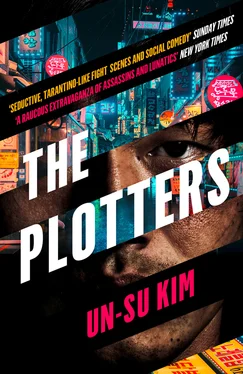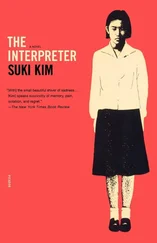Pull it.
Pull it now.
And yet for some reason, Reseng did not pull the trigger and instead set the rifle down on the ground.
“Now’s not the right time,” he muttered.
He wasn’t sure why it wasn’t the right time. Only that there was a right time for everything. A right time for eating ice cream. A right time for going in for a kiss. And maybe it sounded stupid, but there was also a right time for pulling a trigger and a right time for a bullet to the heart. Why wouldn’t there be? And if Reseng’s bullet happened to be sailing straight through the air toward the old man’s heart just as the right moment fortuitously presented itself to him? That would be magnificent. Not that he was waiting for the best possible moment, of course. That auspicious moment might never come. Or it could pass by right under his nose. It occurred to him that he simply didn’t want to pull the trigger yet. He didn’t know why, but he just didn’t. He lit a cigarette. The shadow of the mountain was creeping past the old man’s cottage.
When it turned dark, the old man took the dog inside. The cottage must not have had electricity, because it looked even darker in there. A single candle glowed in the living room, but Reseng couldn’t make out the interior well enough through the scope. The shadows of the man and his dog loomed large against a brick wall and disappeared. Now the only way Reseng could kill him from his current position would be if the old man happened to stand directly in the window with the candle in his hand.
As the sun sank below the ridge, darkness descended on the forest. There was no moon; even objects close at hand were hard to make out. There was only the glimmer of candlelight from the old man’s cottage. The darkness was so dense that it made the air seem damp and heavy. Why didn’t Reseng just leave? Why linger there in the dark? He wasn’t sure. Wait for daybreak, he decided. Once the sun came up, he’d fire off a single round—no different from firing at the wooden target he’d practiced with for years—and then go home. He put his cigarette butt in his pocket and crawled into the tent. Since there was nothing else to do to pass the time, he ate a packet of army crackers and fell asleep wrapped up in his sleeping bag.
Reseng was awakened abruptly about two hours later by heavy footsteps in the grass. They were coming straight toward his tent. Three or four irregular thuds. A torso sweeping through tall grass. He couldn’t decipher what was coming his way. Could be a wild boar. Or a wildcat. Reseng disengaged the safety and pointed his rifle at the darkness, toward the approaching sound. He couldn’t pull the trigger yet. Mercenaries lying in wait had been known to fire into the dark out of fear, without checking their targets, only to discover that they’d hit a deer or a police dog or, worse, one of their fellow soldiers lost in the forest while out scouting. They would sob next to the corpse of a brother in arms felled by friendly fire, their beefy, tattooed bodies shaking like a little girl’s as they told their commanding officers, “I didn’t mean to kill him, I swear.” And maybe they really hadn’t meant to. Since they’d never before had to face their fear of things going bump in the night, the only thing someone with muscles for brains knew how to do was point and shoot into the dark. Reseng waited calmly for whatever was out there to reveal itself. To his surprise, what emerged was the old man and his dog.
“What are you doing out here?” the old man asked.
Now, this was funny. As funny as if the bull’s-eye at the firing range had walked right up to him and said, Why haven’t you shot me yet?
“What’re you doing out here? I could’ve shot you,” Reseng said, his voice trembling.
“Shot me ? How’s that for turning the tables?” the old man said with a smile. “This is my land. You’re the one who doesn’t belong, crashing on someone else’s property.” He looked relaxed. The situation was unusual, to say the least, and yet he didn’t seem at all taken aback. Instead, the one taken aback was Reseng.
“You startled me. I thought you were a wild animal.”
“You’re a hunter?” the old man asked, looking pointedly at Reseng’s rifle.
“Yes.”
“That’s a Dragunov. You only see those in museums. So poachers these days hunt with Vietnam War rifles?”
“I don’t care how old the gun is as long as it can take down a boar.” Reseng tried to sound nonchalant.
“True. If it stops a boar, then it doesn’t matter what gun you use. Hell, if you can stop a boar with chopsticks—or a toothpick, for that matter—you can skip the gun altogether.”
The old man laughed. The dog waited patiently at his side. It was much bigger than it had looked through the scope. And much more intimidating than when it was chasing after a deflated soccer ball.
“That’s a nice dog,” Reseng said. The old man looked down at the dog and stroked its head.
“He is a nice dog. He’s the one who sniffed you out. But he’s old now.”
The dog never took its eyes off of Reseng. It didn’t growl or bare its teeth, but it wasn’t exactly friendly, either. The old man gave the dog’s head another pat.
“Since you insist on staying the night, don’t catch cold out here. Come to the house.”
“Thank you for the offer, but I wouldn’t want to trouble you.”
“It’s no trouble.”
The old man turned and strode back down the slope, the dog at his heels. He didn’t have a flashlight, but he seemed to have no trouble finding his way through the dark. Reseng’s mind was in a whirl. His rifle was charged and ready, and his target was only five meters away. He watched the old man disappear into the darkness. A second later, he shouldered the rifle and headed down after him.
The cottage was warm. A fire blazed in the redbrick fireplace. There were no furnishings or decorations, save for a threadbare rug and small table in front of the fire and a few photos on the mantelpiece. The photos were all of the old man, sitting or standing with others, always at the center of the group, the people at his sides smiling stiffly, as if honored to be photographed with him. None of the photos seemed to be of family.
“Kind of early in the year for a fire,” Reseng said.
“The older you get, the more you feel the cold. And I’m feeling it more than ever this year.”
The old man stuffed a few pieces of dry wood into the fire, the flames balking briefly at the new addition. Reseng unslung his rifle from his shoulder and leaned it against the doorjamb. The old man stole a glance at the gun.
“Isn’t October closed season for hunting?”
There was a twinkle in his eye. He’d been using banmal, the familiar form of speech, as if he and Reseng were old friends, but it didn’t bother Reseng.
“A man could starve to death trying to follow every law.”
“True, not all laws need to be followed,” the old man murmured. “You’d be stupid to try.”
As he stirred the logs with a metal poker, the flames rose and licked at a piece of wood that had not yet caught fire.
“Well, I’ve got booze and I’ve got tea, so pick your poison.”
“Tea sounds good.”
“You don’t want something stronger? You must’ve been freezing.”
“I don’t usually drink when I’m hunting. Besides, it’s dangerous to drink if you’re going to sleep outdoors.”
“Then indulge tonight,” the old man said with a smile. “Not much chance of freezing to death in here.”
He went to the kitchen and returned with two tin cups and a bottle of whiskey, then used a pair of tongs to carefully retrieve a kettle of black tea from inside the fireplace. He poured tea into one of the cups. His movements were smooth and measured. He handed the cup to Reseng and filled his own, then surprised Reseng by topping it off with whiskey.
Читать дальше












